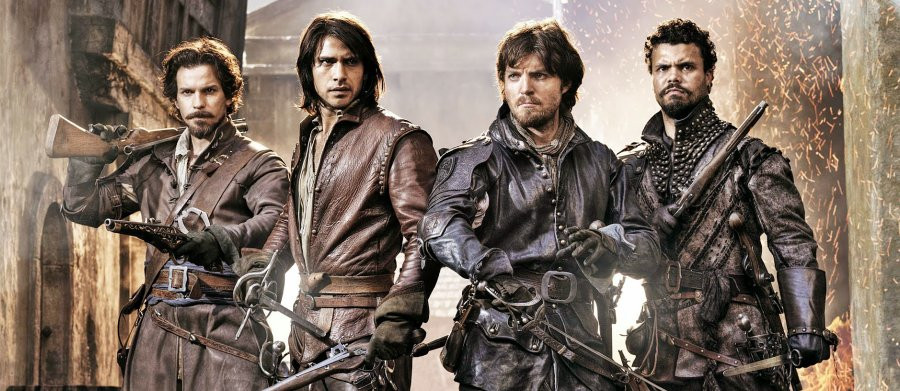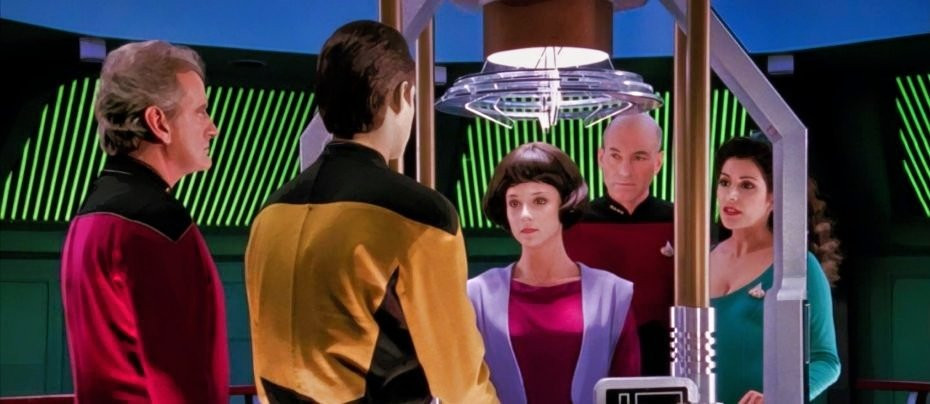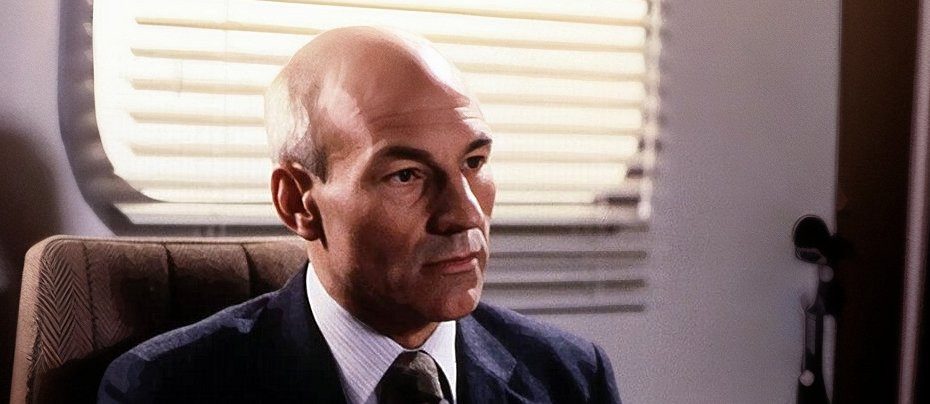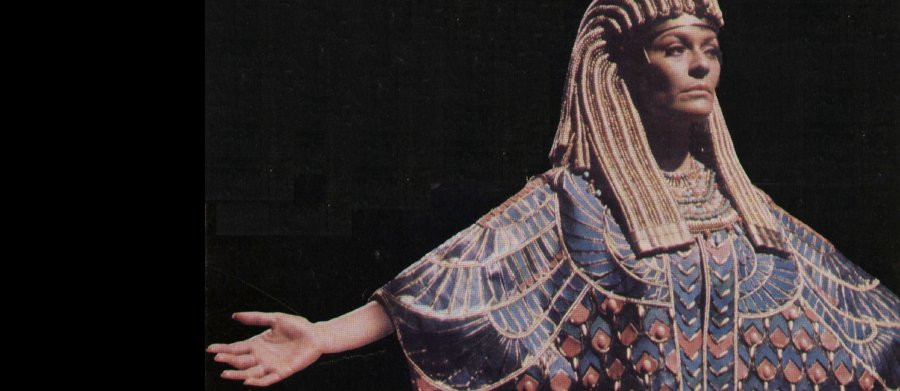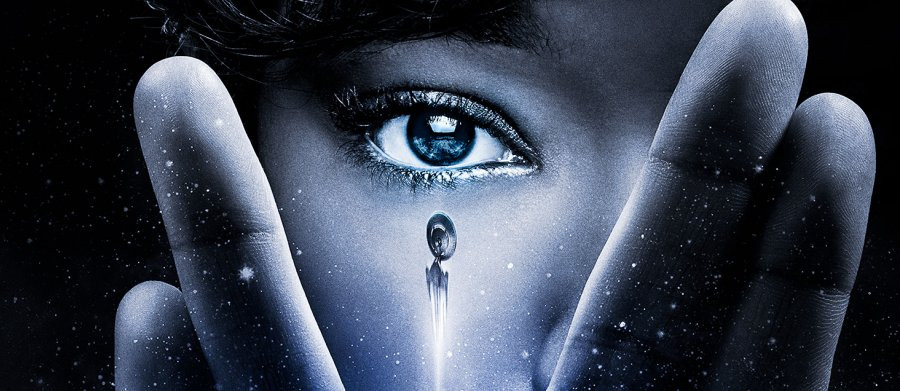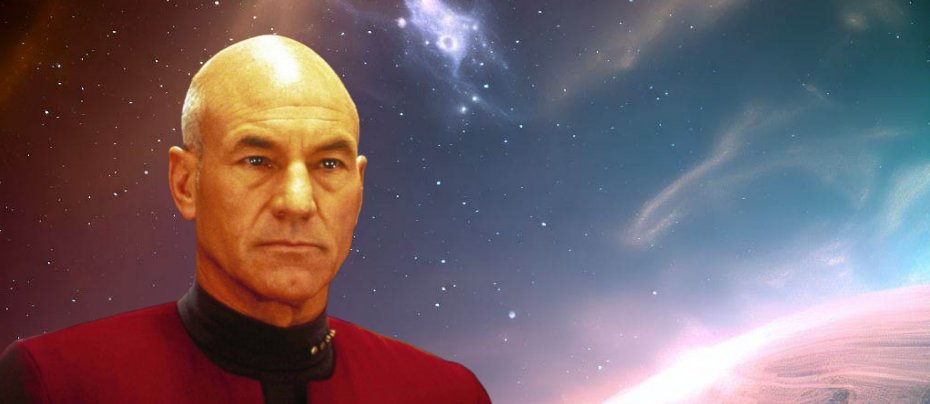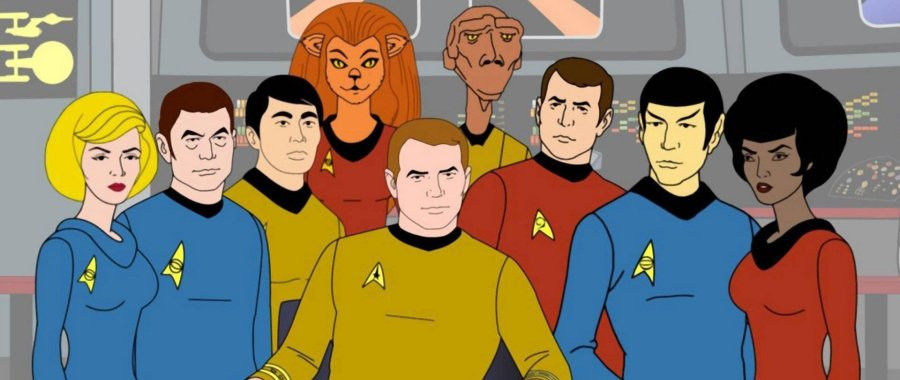
Star Trek: Picard - Season 2
Spoiler alert. We have tried not to be too obvious about the big twists, but this overview of Season Two of Star Trek: Picard does contain some spoilers and it is recommended you watch the season before reading this.
In order to decide whether you want to commit to that, you will want to know whether it is worth watching in the first place - to which the answer is a definite "Yes," or, to be more precise, a definite "Yes, but..."
Star Trek Picard review by John Winterson Richards
It is fair to say that Star Trek fans - the people who really put "fanatic" into fandom - are deeply divided on Star Trek: Picard. This is unusual because there seems to be a broad consensus among people who probably take Star Trek far too seriously that the Original Series, The Next Generation, and Deep Space Nine are landmarks of Western Civilisation, while Voyager and Enterprise are flawed but not without their merits, and Discovery is best not mentioned. There is no such consensus about Picard. Some really liked it but a great many positively hated it.
The main point of contention is the more adult tone of the piece. This is most controversial in its abandonment of Gene Roddenberry's generally optimistic view of the future, at least in his terms, in favour of a sour 21st Century perspective. This is more realistic and believable in many respects, but people never looked to Star Trek for gritty reality. They watched it to escape all that. They wanted to hope that things will get better.
It should perhaps be remembered that all the various incarnations of Star Trek have been to a great extent a reflection of the times in which they were made. The Original Series was conceived in aftermath of the Kennedy Administration and there is a definite propagandist element to its positivity. The Next Generation was even more upbeat because it was a product of the euphoria of the surprisingly peaceful end of the Cold War. It is therefore only to be expected that Picard is in turn a product of its time, a more uncertain period in our history. It should also be noted that even in the classic first three television versions, especially Deep Space Nine, there was a subtext, or at least hints, that all was not well in the Federation. So Picard is by no means at odds with the ethos of classic Star Trek.
This reviewer takes a middle position on all this, inclining more to the favourable view of the show growing up a bit, but understanding why people feel upset at the loss of their childhood innocence, the days when they could be confident that all would be well at the end of the episode even when the story went to some pretty dark places along the way.

The best things about Season One were the cast and characters, and the fact that Amazon had obviously spent a great deal of money literally making the production look good in the visual sense. The worst things were the plotting and the pacing.
The same is broadly true of Season Two. Having put together a likeable crew of misfits by the end of Season One, with the pleasant prospect of them all hitting the Final Frontier for adventures together, Season Two begins with them all split up, having gone their separate ways. Some of those ways seem odd. After getting a new lease of life, Picard is simply back at his vineyard, watching machines harvest and bottle his wine for him. Chris Rios, a Han Solo or Mal Reynolds type, is suddenly a regular Star Fleet Captain. Romulan samurai Elnor is a Cadet at Star Fleet Academy. Are these the same people?
Yet they all seem to have bonded so that they are now all close friends when they meet. How long exactly were they together in the first season and in the intervening period? Not long, but long enough for Rios and Dr Agnes Jurati to have had a fling and for it to be over. More surprisingly, it is implied, more and more heavily as the season progresses, that Raffi and Seven of Nine have also been more than just friends, despite nothing on these lines ever having been suggested before. Again, are these the same people?
Anyway, it takes a couple of episodes to get the gang back together. A lot of people liked these first two episodes but it must be said that it is tedious to have to wait until the third episode for the main story to get properly underway.
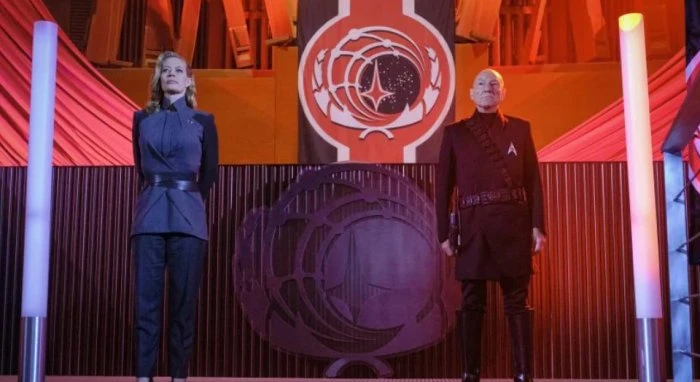
That story is pretty tense, if a little formulaic. Our heroes have a limited amount of time to stop something very bad happening and then get home. New adversaries and obstacles are put in their way, and they meet new allies. This is traditional Star Trek storytelling and all the more welcome for it. To be honest, if you think about it for more than thirty seconds, there are a huge number of gaping holes in the plot and inconsistencies with previous canon - which, since this is Star Trek matters a lot to a lot of people - but the pacing is much better than it was in the previous season, so you will probably only think of them all afterwards unless you are one of those fans with a Spock-like brain for such things.
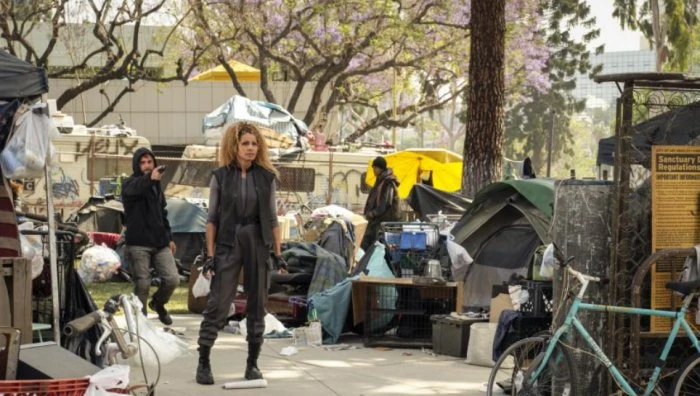
To compensate there are a great many references or 'homages' to the canon for such fans to enjoy spotting them. Some are not subtle. Indeed, the plots of whole episodes are recycled - we get one with an evil parallel universe, one with time travel, one with Picard being interrogated, one with him trapped inside his own mind, etc. This perhaps invites unfavourable comparisons with the original classics, but some of the more detailed references are fun, especially a couple of witty moments that pay tribute to one of the most fondly remembered of the feature films, Star Trek IV: the Voyage Home.
References to that film are particularly appropriate because it just so happens - as it does so often in science fiction - that the destination point of the time travel is the United States around the period when filming is taking place. Well, what are the odds on that? Very short as it turns out, because it is a narrative device that enables observations to be made about the current state of our world and, more importantly, saves a fortune on production.
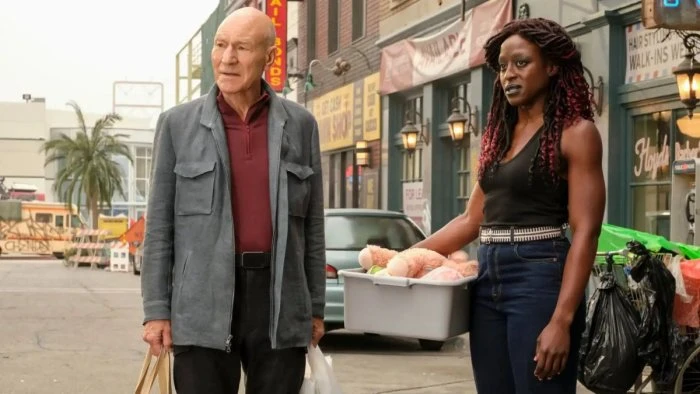
Quite a lot still seems to have been spent on location work, especially in Los Angeles. The best visual scenes, including a good old fashioned car chase in Downtown, are positively cinematic, but there are also some fairly cheap looking sets and computer generated imagery that remind us that this is still television science fiction. It should be stressed that this does not mean that the CGI is poor. On the contrary it is generally of a very high quality. The problem is that viewers have now become very good at recognising it for what it is and the strength of some of the live action sequences actually makes the contrast with the effects all the more obvious.
Overall, Season Two scores high on aesthetics, possibly higher than Season One. The elegiac theme music also sticks in the mind.
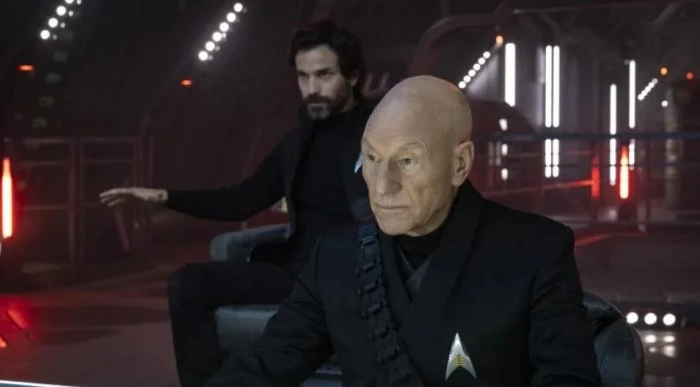
The real reason to watch the show is, of course, in the title, and it has to be said that Sir Patrick Stewart still delivers the goods as the eponymous Admiral. All right, there are some scenes, especially where some action is required, where it is painfully obvious that this is a man in his eightieth year, but we also get what we paid to see, some moving speeches by a first class Shakespearean. There is one about fear that is particularly powerful. One character says she wishes Picard was her father and she is far from alone in that.
There would probably be a good market for nine hours of Picard doing no more than just sitting and doling out paternal advice.
Most revivals of once popular shows are essentially pointless, except for the obvious financial motivation. This is not true of Picard, even if Jeff Bezos effectively driving an Amazon delivery van full of cash to Sir Patrick's house was doubtless a factor. Picard has some original and important things to say about ageing, coming to terms with mortality, and reflecting on life that could not have been said by the younger Jean-Luc.

Season Two Picard has a serene wisdom that Season One Picard seemed to lack. He is also more of a leader, the producers evidently having addressed the widespread criticism that he seemed to lack agency for much of the previous season. There is, however, one major irritation. The huge change at the end of Season One comes across as wholly irrelevant. No one, not even Picard himself, seems interested in whether Picard is even really Picard any more. While it may be possible to transfer memories to a new body, given the technology, that is not the same as transferring consciousness. Is consciousness something that can ever be transferred? Or can it at best just be copied? If so, would it be the same consciousness? What are the implications? Might physical immortality be possible? Would we really want it if it was? The usually very reflective Picard suddenly seems totally unmoved by his own unique experience.
Neither are any of the people who are or must be aware of this are intrigued by it. Yet again, are these the same people we met before?
They still make an agreeable gang, even if their tight bonding in a relatively short amount of time seems a bit contrived. Picard, or Stewart, retains the gift of becoming the focus of an interesting group. This is the best thing about Season Two as it was about Season One.
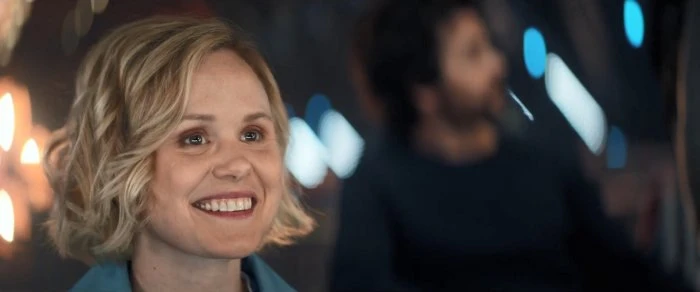
Were it not for Stewart's presence, Alison Pill would be acknowledged as having stolen the show. She starts as a goofy science geek with more than a touch of comic relief about her, but from there she gets to go to some really dramatic places. She finds herself in a struggle for her own soul with a powerful entity. She goes on to be a 'femme fatale' and later an authority figure. She even gets to sing at one point.
Michelle Hurd has real personality as Raffi and it is a great pity that the writers do not really know what to do with the character. She makes a great bickering double act with Seven, so that it was quite unnecessary to dump a contrived sexual agenda on top of it which actually detracts from a convincing portrait of female friendship - itself a rarity in science fiction.
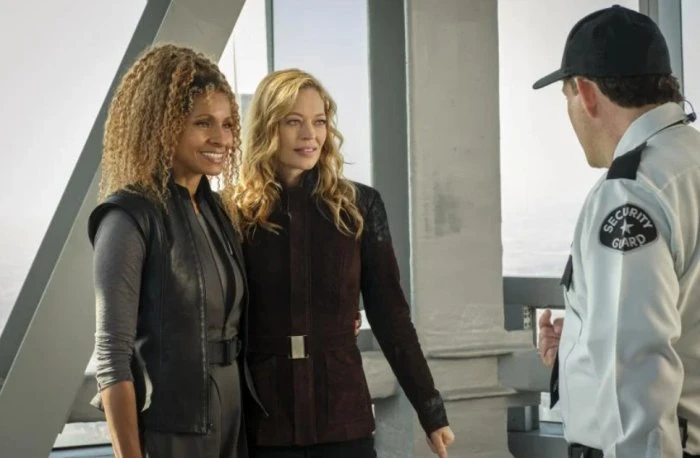
It is also a pity that so little is made of the subplot in which Seven (Jeri Ryan) loses her vestigial Borg-ness. It is interesting to note how she demonstrates, as Picard himself did in Star Trek: First Contact, that no one is more anti-Borg than an ex-Borg. So much for the Star Trek message that understanding breeds tolerance. That ethos does prevail in the end, but not through Seven, who seems a bit irrelevant where she should be most relevant.
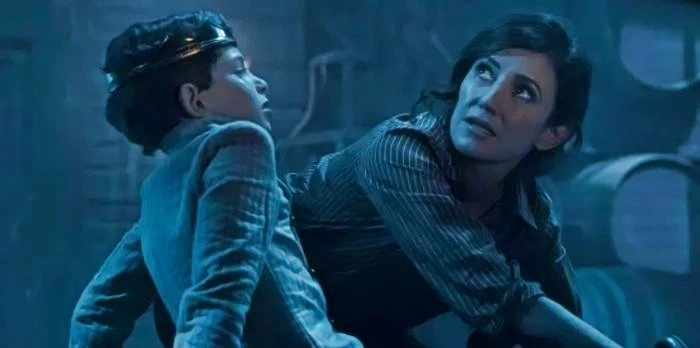
Orla Brady, whose relatively brief appearance as Laris, Picard's apparently Irish-Romulan secret police trained housekeeper, made a big impression in Season One - despite her being inexplicably left on Earth for most of it - happily gets a lot more to do here. In the intervening period Laris has been rather conveniently widowed. No prizes for guessing where this is going, in spite of her looking young enough to be Picard's daughter.
In purely dramatic terms - and this from someone not exactly known for being "woke" or "politically correct" - it is very refreshing to have a drama in which so much of the plot, dialogue, and character development is carried forward by four actresses of an age appropriate for the knowledge and experience of their characters. No one would blink twice if four middle aged males were doing the same, but it still a rarity for women to be allowed to be, well, normal in this way. Even now female representation is too often in the form of sexy youngsters given an unlikely level of maturity. Picard gives us strong women as they really are. Pill, Hurd, Ryan, and Brady make it all seem credible and natural and unforced. It is not by any means pushing an agenda to want to see more of this sort of thing.
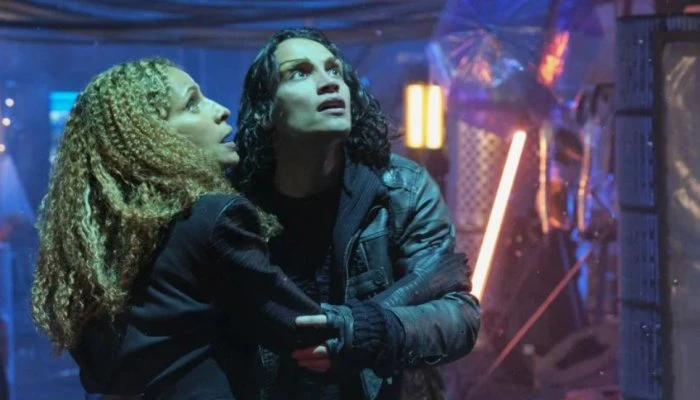
Santiago Cabrera balances this with a strong shot of testosterone as Rios. It is a pity that the character now has so little in common with the almost piratical adventurer of the previous season and his arc is ultimately a disappointment. His multiple hologram versions of himself are also missed. Evan Evagora is likeable as Elnor, but no one can make the character interesting, and it is no great loss that he is sidelined for most of the season.
Without spoiling surprises by naming names, four familiar faces from The Next Generation turn up in guest roles, and we get to say an emotional final farewell to one of them - but since we said an emotional final farewell to another of the four in the last season and he turns up again, maybe the farewell is not so final.

Jay Karnes, from The Shield and Sons of Anarchy, is well cast as a cut price Fox Mulder. Sol Rodriguez is very attractive and it is not her fault that her role, as an unlikely Latina physician running a clinic for immigrants, is just the sort of contrivance that the four older actresses are challenging. Annie Wersching channels Alice Krige very effectively as a Borg Queen with a notably human dose of megalomania. Her scenes with Pill are particularly good.
Science fiction fans will welcome James Callis, who committed grand larceny in the "reboot" of Battlestar Galactica, making a house call on another big franchise.
There has been some criticism of the show's heavy handed political subtext. While there is, again in purely dramatic terms, irrespective of what one feels about the actual agenda, some merit to the complaint, it ought not to be forgotten that The Next Generation also wore its politics in its sleeve. The difference is that the "Culture Wars" are now very much a real conflict and viewers are more likely to be sensitive to such things. This may be one of the reasons why fan reaction has been so divided. Viewed objectively, Season Two is well produced, well acted, visually impressive, and true to the traditions of Star Trek. It seems to have learned from at least some of the mistakes of Season One. The plotting is untidy - Executive Producer Alex Kurtzman seems to have a thing for "time jumps" which has not always served him well - but in the end it is a satisfying story and the characters keep us involved. We really have no right to expect more from it than that. If the upcoming third and final season takes Picard all the way home with the dignity the character deserves, the show will have been worthwhile.
Published on June 5th, 2022. Written by John Winterson Richards for Television Heaven.



